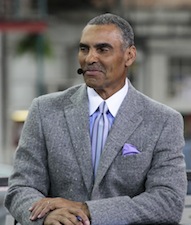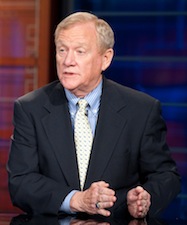ESPN analysts Polian, Edwards and Mangini offer expertise and insight on NFL free agency
NFL’s free agency period begins next Tuesday at 4 p.m. ET and the buzz surrounding who will go where is beginning to simmer over.
In an effort to gain some perspective on how free agency affects coaches and general managers, Front Row queried ESPN analysts Bill Polian (former GM of Buffalo and Carolina and former President and Vice Chairman for Indianapolis) and Herm Edwards (former Kansas City and New York Jets head coach).
Additionally, in the SportsCenter video above, former Cleveland and Jets coach Eric Mangini shares his own free agent recruiting story involving Brett Favre.

(Don Juan Moore/ESPN Images)
On evaluating players during free agency:
H.E.: You always look at the guy’s age and his production. And obviously, if he’s coming off injury, that was a concern. Players make most of their money in their second contract. If you’re getting a guy after his second contract, you’re very hesitant of paying a veteran player — because he’s going to want a long deal.
If you get him when he’s 31 and you look at his shelf life, he might only be a two-year fix, and you don’t want to be caught with a guy for four years when he only really has two good years left. It hurts you on the salary cap. If you cut him, the money goes on your cap and now you lose the player and you still have the money so that affects your football team down the road. There has to be a plan and you can’t panic. And the organizations that go about free agency in that way — that have a good plan — they never get themselves in a bad way.
B.P.: In free agency, you’re looking to fill a need. In free agency, you’re absolutely looking at the finished product. Those players are not going to get any better than they are now at 26 or 27. They’re at their peak. They’re not going to get better. They are what they are. So as I looked at free agency as a general manager, what I’m looking for is the finished product. Whereas with the draft, no matter where you take them, they’re not the finished product.

(Joseph Faraoni/ESPN)
On a decision you would have liked to revisit:
H.E.: When I was in Kansas City, we had the chance to get Chad Pennington before he went to Miami. I felt maybe if I would have pushed that more, that would have helped our football team. But he ended up going to Miami, and they ended up winning the division. And this was when Brett Favre came to New York and we had an opportunity to get him. We had two veteran quarterbacks there, and it just felt like we couldn’t do it at that point in time because of the money, because we were right there with the cap. After my first year and the second year, I just felt like if we would have gotten Chad Pennington, we might have had a chance to do some things, but it didn’t work out.
On free agency vs. NFL Draft:
B.P.: You could sit here, and I often did, and say this player should command only X. And then the market would open up and the player would come in at X plus Y. And you’d say, ‘Oops, well, that’s not in our bailiwick’.
So, in theory, at least, you’re able to say, OK, I can plug this guy in, and he will perform at a certain level.
So it is a question of ‘Can I get a better guy in the draft? Can I get a better guy that can come in right away and perform at a reasonably high level right away? And know that he’s the finished product as opposed to one that I have to develop?’ That is the allure of free agency.
H.E.: You’re never one player away. You always think you are, but you’re really not. It’s about drafting players and having a system of drafting the guys that fit your criteria. And when you can do that and you can just continue to build it for two or three years, you’re going to end up with a good football team. I was never a big gambler in free agency. I always just felt, there’s going to be a bottom line of money we’re going to pay a guy and if it goes over that, we’ll be OK. We’ll move on and I’ll play a young guy. I was big in developing our players and drafting them.







